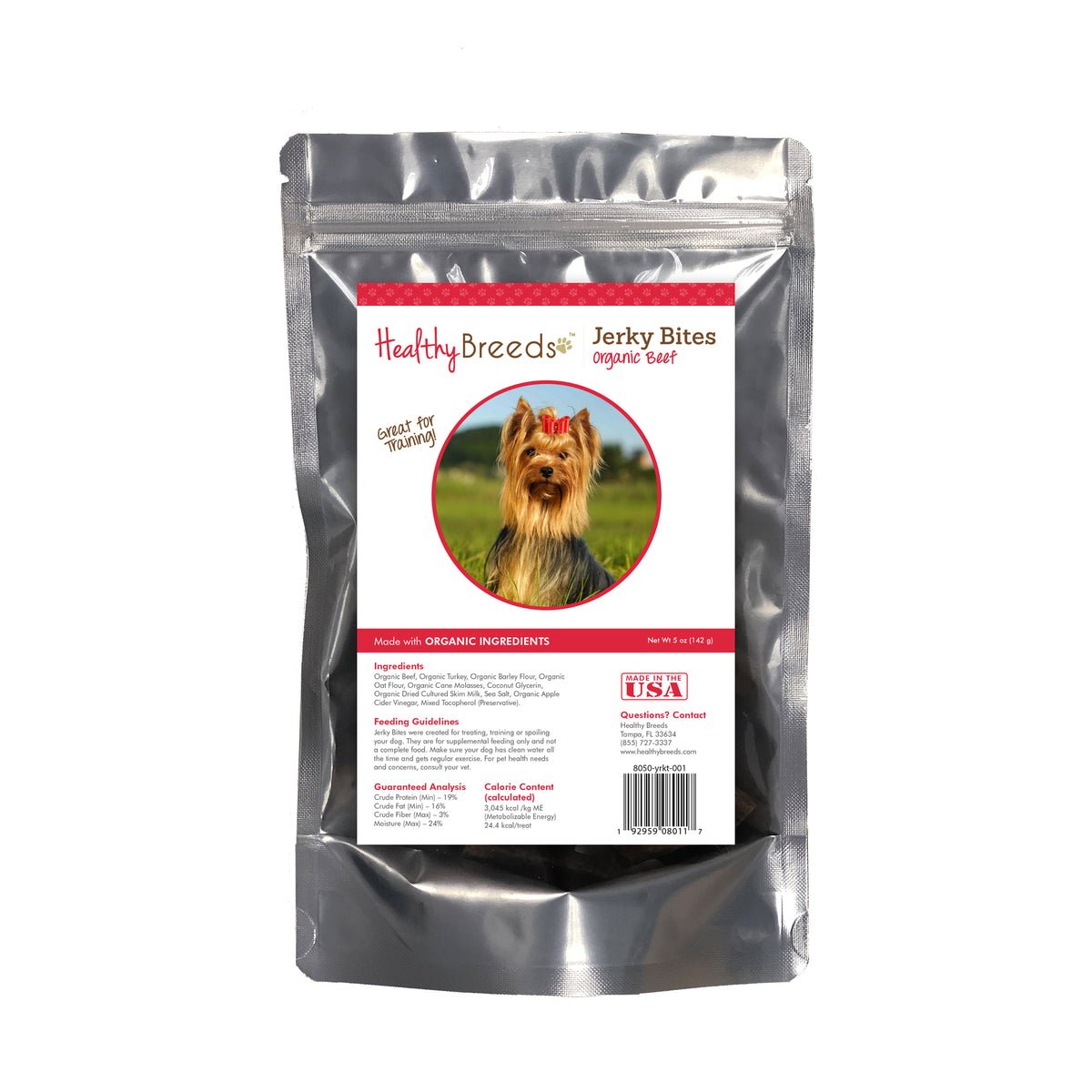Can your adorable Yorkie munch on some delicious jerky? It’s a common question among dog owners, and we’re here to dish out the answer. Let’s dive into whether or not your pint-sized pup can enjoy this tasty treat without any worries.
Now, Yorkies may be small in size, but they have big personalities and even bigger appetites. But when it comes to jerky, caution should be exercised. Some types of jerky can be harmful to our furry friends, while others can be perfectly fine. So, let’s unravel the mystery behind whether your Yorkie can indulge in this savory snack.
Keep reading to find out what factors you need to consider before handing over a piece of jerky to your four-legged companion. We’ll help you navigate the ins and outs of jerky consumption for your beloved Yorkie.
Wondering if jerky is safe for your Yorkie? While jerky can be a tasty treat for many dogs, it’s best to avoid feeding it to your Yorkie. Yorkies are prone to pancreatitis and gastrointestinal issues, and the high fat and sodium content in jerky can exacerbate these conditions. Stick to Yorkie-friendly treats like small pieces of cooked chicken or specialized dog treats for a healthier option.

Can Yorkies Have Jerky? Exploring the Safety of Jerky for Yorkies
When it comes to treats for our beloved Yorkies, it’s important to be cautious and informed about what is safe for them to consume. Jerky is a popular snack, but can Yorkies have jerky? In this article, we will delve into the topic and provide you with detailed information on the safety of jerky for Yorkies. Read on to find out more!
What is Jerky and Why is it Popular?
Jerky is a form of dried meat that has been seasoned and cured to create a savory, chewy snack. It is commonly made from beef, chicken, turkey, or fish. The popularity of jerky stems from its long shelf life, portability, and high protein content. Many people enjoy jerky as a convenient and tasty snack option.
However, when it comes to our furry friends like Yorkies, we need to exercise caution and consider their unique dietary needs. While jerky can be a great source of protein, there are factors to consider before offering it to your Yorkie.
The Potential Risks of Jerky for Yorkies
While jerky can be a delicious and nutritious snack for humans, it may not be suitable for Yorkies due to a few reasons. One of the main concerns is the high sodium content often found in commercial jerky. Yorkies are small dogs, and excessive sodium intake can lead to health issues such as dehydration and kidney problems.
In addition to the sodium content, the preservatives and seasonings used in some jerky products may not be suitable for Yorkies. These additives can cause stomach upset, allergic reactions, or other adverse effects. It’s important to read the ingredient labels carefully and avoid jerky that contains harmful substances or excessive amounts of salt.
Furthermore, the texture of jerky can also pose a potential choking hazard for small dogs like Yorkies. The tough and chewy nature of jerky can be difficult for them to break down, increasing the risk of choking or digestive issues. It’s crucial to prioritize the safety and well-being of your Yorkie when considering any type of treat.
Alternatives to Jerky for Yorkies
While jerky may not be the best option for your Yorkie, there are plenty of alternative treats that you can offer them. Opt for treats that are specifically formulated for small dogs or those with low sodium content. Look for natural and wholesome ingredients that are gentle on your Yorkie’s stomach.
Fruits and vegetables can also be a healthy alternative to jerky for Yorkies. Apples, carrots, and blueberries are safe and nutritious options that can be offered as treats. Just remember to remove any seeds or pits and cut them into small, bite-sized pieces to prevent choking hazards.
Always consult with your veterinarian before introducing any new treats or foods into your Yorkie’s diet. They can provide you with personalized advice based on your Yorkie’s specific needs and dietary requirements.
Tips for Safe Treats and Snacks
To ensure the safety and well-being of your Yorkie, here are some tips to keep in mind:
- Read and understand ingredient labels carefully to avoid harmful substances.
- Choose treats specifically formulated for small dogs or low sodium options.
- Opt for natural and wholesome ingredients that are gentle on your Yorkie’s stomach.
- Avoid treats that are too hard or tough, as they can pose a choking hazard.
- When introducing a new treat, monitor your Yorkie for any adverse reactions or digestive issues.
- Offer treats in moderation and as part of a balanced diet.
Conclusion
While jerky may be a popular snack for humans, it’s important to think twice before sharing it with your Yorkie. The high sodium content, potential additives, and choking hazards make jerky a less-than-ideal choice for these small dogs. Instead, opt for treats that are specifically formulated for Yorkies or choose natural alternatives like fruits and vegetables. Always prioritize your Yorkie’s safety and consult with your vet for personalized advice. With responsible treat choices, you can ensure that your Yorkie stays happy and healthy!
Key Takeaways: Can Yorkies Have Jerky?
- Yorkies should avoid consuming jerky, especially store-bought ones.
- Jerky can be high in sodium, which can be harmful to Yorkies.
- The preservatives and spices in jerky can upset a Yorkie’s sensitive digestive system.
- Certain types of jerky may contain ingredients that are toxic to dogs, such as onion or garlic powder.
- If you want to give your Yorkie a treat similar to jerky, opt for specially-made, all-natural dog treats instead.
Frequently Asked Questions
Are you wondering if it’s safe for your Yorkie to have jerky? Look no further! We have compiled a list of commonly asked questions about whether Yorkies can have jerky and provided detailed answers below.
1. Is it safe to give jerky to my Yorkie as a treat?
While jerky may seem like a delicious treat for your Yorkie, it’s important to exercise caution. Many commercial jerky products are high in sodium, preservatives, and flavorings that might not be suitable for your furry friend’s digestive system. Furthermore, some jerky may contain ingredients that can be harmful to dogs, such as onions or garlic. It’s always best to consult with your veterinarian before giving jerky to your Yorkie.
If you’re keen on treating your Yorkie with jerky, you can opt for specially made dog jerky treats that are formulated with their dietary needs in mind. Look for low-sodium options that do not contain any harmful ingredients and follow the recommended serving size to avoid overfeeding. Your pet’s safety is always the top priority!
2. Can jerky cause an upset stomach in Yorkies?
Yes, jerky can potentially cause an upset stomach in Yorkies. Some dogs may have a sensitive stomach, and the high fat content, spices, and preservatives found in jerky can be hard for them to digest. Symptoms of an upset stomach in dogs can include vomiting, diarrhea, and discomfort. It’s always important to introduce new foods gradually and monitor your Yorkie’s reaction.
If you suspect that your Yorkie has consumed jerky and is experiencing digestive issues, it’s best to consult your veterinarian. They can provide guidance on how to alleviate the symptoms and may recommend a bland diet for a short period until your pup’s stomach settles.
3. Are there any jerky alternatives for Yorkies?
Absolutely! There are plenty of jerky alternatives that you can safely give to your Yorkie. Consider options such as dehydrated chicken or turkey strips made specifically for dogs. These treats are often free from harmful additives and can be a tasty and healthier alternative to traditional jerky.
You can also explore homemade jerky recipes designed for dogs. By making jerky yourself, you have complete control over the ingredients, ensuring that your Yorkie is getting a safe and nutritious treat. Just remember to avoid using ingredients that are toxic to dogs, such as onions or garlic.
4. Should I be concerned about the salt content in jerky?
Yes, you should be cautious of the salt content in jerky when considering it for your Yorkie. Yorkies are small dogs, and their bodies are more sensitive to excessive salt intake than larger breeds. High levels of salt can lead to dehydration, electrolyte imbalances, and other health issues in dogs.
If you decide to give your Yorkie jerky, opt for low-sodium varieties specifically made for dogs or consider making your own homemade treats with minimal salt. Moderation is key, and it’s always best to consult your veterinarian about the appropriate amount of jerky your Yorkie can safely consume.
5. Can jerky be a choking hazard for Yorkies?
Yes, jerky can pose a choking hazard to Yorkies, especially if it is not cut into appropriately sized pieces. Dogs, including Yorkies, can sometimes swallow large chunks of food without chewing them properly, increasing the risk of choking. To prevent this, make sure to cut jerky treats into small, manageable pieces that your Yorkie can safely consume.
It’s also important to supervise your Yorkie while they are enjoying their jerky treat, especially if they tend to gulp down food quickly. By monitoring their chewing and ensuring they take small bites, you can minimize the risk of choking and promote safe and enjoyable snacking for your furry friend.

Summary
So, can Yorkies have jerky? Well, the answer is yes, but with caution. Jerky can be a tasty treat for your Yorkie, but there are a few things to keep in mind. Firstly, make sure the jerky is made specifically for dogs and doesn’t contain any harmful ingredients. Secondly, give it to your Yorkie in moderation, as too much jerky can upset their sensitive stomach. Lastly, always monitor your Yorkie while they are munching on jerky to avoid any choking hazards. Overall, while jerky can be a delicious snack, it’s important to be mindful and prioritize your Yorkie’s health and safety.
In conclusion, if you want to treat your Yorkie to some jerky, go for it! Just remember to choose dog-friendly jerky, give it in moderation, and supervise your furry friend. By following these guidelines, your Yorkie can enjoy the occasional jerky snack without any issues.
